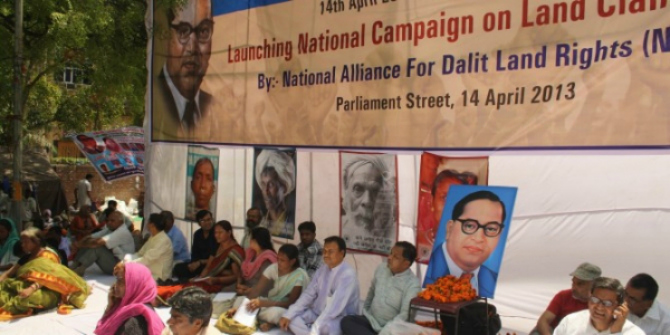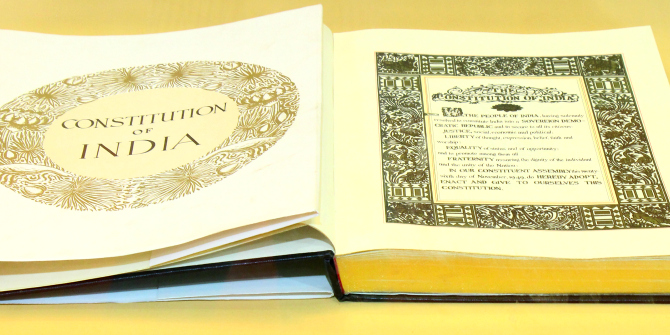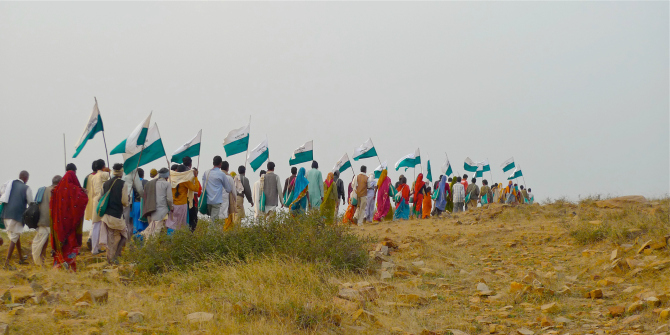 Gurpreet Mahajan tackles the predisposition of political theory to be limited by the Western canon, offering insights into the social and political life of contemporary India, and how it differs from the dominant liberal paradigm. Jastinder Kaur finds that this is a worthy contribution to Zed Books’ World Political Theories series, which itself is arguably a long overdue challenge to the conceit that political theory and praxis must necessarily conform to Western cultural ideas and ideals, without due regard for non-Western contexts and realities. Mahajan has done well to introduce to non-Indian audiences the concept of democracy as a three-legged stool in India that requires the continual negotiation and inter-dependence of state, society, and individual.
Gurpreet Mahajan tackles the predisposition of political theory to be limited by the Western canon, offering insights into the social and political life of contemporary India, and how it differs from the dominant liberal paradigm. Jastinder Kaur finds that this is a worthy contribution to Zed Books’ World Political Theories series, which itself is arguably a long overdue challenge to the conceit that political theory and praxis must necessarily conform to Western cultural ideas and ideals, without due regard for non-Western contexts and realities. Mahajan has done well to introduce to non-Indian audiences the concept of democracy as a three-legged stool in India that requires the continual negotiation and inter-dependence of state, society, and individual.
 India: Political Ideas and the Making of a Democratic Discourse. Gurpreet Mahajan. Zed Books. October 2013.
India: Political Ideas and the Making of a Democratic Discourse. Gurpreet Mahajan. Zed Books. October 2013.
As a Professor of Political Science at Jawaharlal Nehru University, New Delhi, Gurpreet Mahajan has been ruminating about the nature of political theory in India for more than two decades, and in India: Political Ideas and the Making of a Democratic Discourse we have a timely apotheosis of her academic engagement with the question of how non-Western states have made democracy their own. The book comes at a critical juncture in India’s modern history, with record-breaking numbers of citizens already exercising their right to vote in India’s 2014 general election, which runs from 7th April to 12th May. In Assam, the major election issues are flood erosion problems, housing for the poor, and welfare for the tea plantation workers. In Delhi, the focus is squarely on anti-corruption, and the status and safety of women; while in the northern region, concerns focus on the stuttering economy.
The 2014 general election reminds us of the immensity of difference in India, and rather than shy away from this complexity, Mahajan makes it the cornerstone of her seminal contribution to the World Political Theories series from Zed Books. Challenging perceptions about the universality of political theory, Mahajan delves into the difference that is writ large in the psyche of India, and through which the subcontinent’s political philosophy needs to be refracted in order to be cogently understood. In the course of a very concise book (it is fewer than 200 pages, 30 of these providing detailed and often very interesting, if slightly tangential notes), Mahajan sketches the ontology of political policy and discourse in India without subscribing to notions of cultural essentialism.
Mahajan divides the book into four sections, these being equality, freedom, religion, and diversity. These are, one suspects, meant to cover the full gamut of ways in which difference is inscribed in Indian politics and culture, and though there is a clear dissonance in including a basic marker of identity – religion – in amongst other more general democratic principles and values, Mahajan does a good job of revealing the dynamic quality of these values and rights, not merely in the development of Indian political theory but in the development of the Indian nation.
Lest we forget the touchstones of difference and dynamism that are central to Mahajan’s thesis, she reminds us throughout this book that everything is contentious, everything is continually being made and remade. Indeed, difference and dynamism incur a certain amount of destabilisation, perhaps even disorder. Thus, the chapter on equality navigates the transition from colonial inequalities, through the tension between individualist and group rights, to the affirmative action policies enshrined (and inevitably contested) as the moral and pragmatic corrective to caste inequalities in modern India.

The chapter on freedom charts the changing conceptions of Swaraj – and its tenet of an inner moral compass motivating one’s spiritual individualism simultaneous with one’s existence within a larger social polity – and how this has oriented a relationship between individual, society, and state which perceives it as harmonious and as requiring a level of state interventionism at the same time.
Mahajan goes on to demonstrate how India, in a continent of myriad religious identities existing in a world of myriad sectarian conflicts, has by and large refused to subjugate its peoples to the forced secularism that we expect and encourage as normal in the West. This isn’t to disregard the homogenisation of Hindu identity that has waged intermittently since the 1980s, nor legal interpretations that seem to disinter the constitutionality of religious rights.
However, as Mahajan shows in the penultimate chapter on diversity, not only is India the world’s largest numerical democracy, but it is in a constant state of transformation and becoming. India has made democracy its own. Using political ideas and values long identified as Western in origin, India has transcended the social contract between the individual and the state. India has, according to Mahajan, pulled off a complex triangulated democratic relationship comprising individual, society and state.
Here, then, is a democracy whose value lies not in submerging difference but in flourishing alongside, adapting to, and shaping difference. In India, Mahajan seems to be arguing, we have a democracy that is altogether more refined than its Western counterpart, rooted not in a concept of the unencumbered individual self but seeking to be dynamic in managing an estimated 1.27 billion individuals who demand to be recognised as complex individuals with complex needs and associational ties and obligations and identities.
The result of Mahajan’s scholarship is a book that positions India as a crucible of inter-subjective and historical relations between its own myriad practices and the influences of various eras of imperial domination. If, as we tend to believe nowadays, history is continually in the making, then India is continually in a process of becoming. There is, then, no India that we can point to and say: that is India. For, India is always transforming, always in a state of becoming.
Ultimately, this is a worthy contribution to the World Political Theories series, which itself is arguably a long overdue challenge to the conceit that political theory and praxis must necessarily conform to Western cultural ideas and ideals, without due regard for non-Western contexts and realities. Having said this, Mahajan does not bring us to any new or greater understandings of what the future holds for this globally significant country, though this may be a consequence of the series editors’ decisions to limit the word count.
If that is the case, then Mahajan has done well within such confines to introduce to non-Indian audiences the concept of democracy as a three-legged stool in India that requires the continual negotiation and inter-dependence of state, society, and individual. Congratulations to Mahajan for whetting our appetite for a more detailed exposition and analysis of a uniquely Indian model of democratic theory and praxis.
———————————
Jas Kaur is a PhD student at the School of Oriental & African Studies in London. She is writing a biography of the ethnic paradigm in Fiji, based on ethnographic fieldwork on the political and affective dimensions of coups and conflict, and a re-imagining of the ethnographic present and the relationship of time, history and context to anthropology. You can follow her on Twitter @missjaskaur or read her blog on Fiji at http://fijimuse.wordpress.com. Read more reviews by Jas.








2 Comments